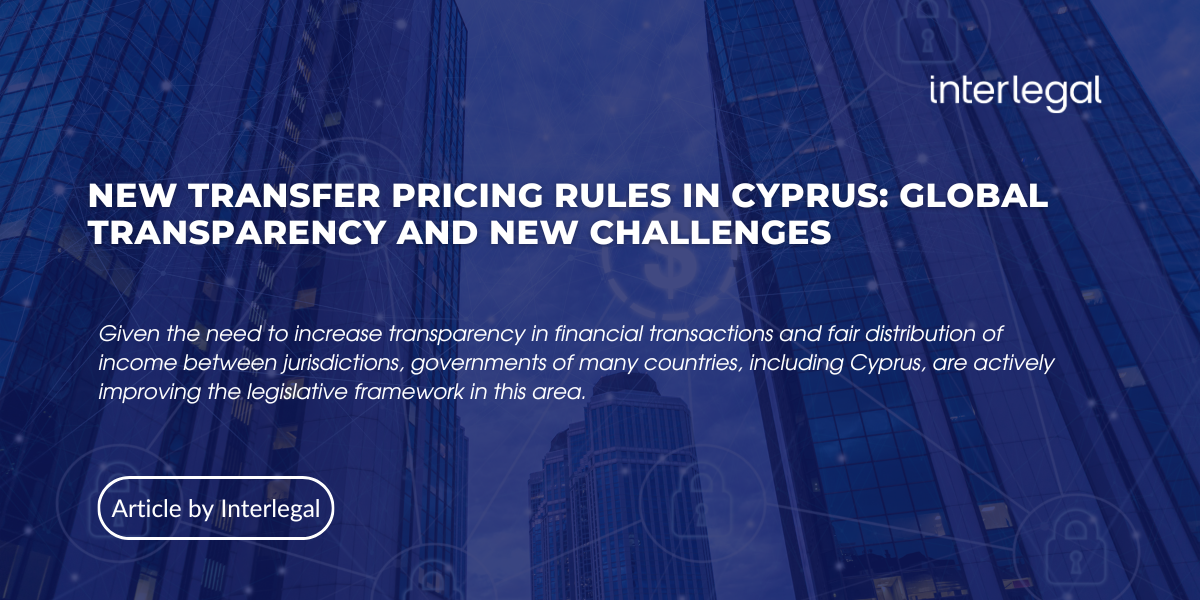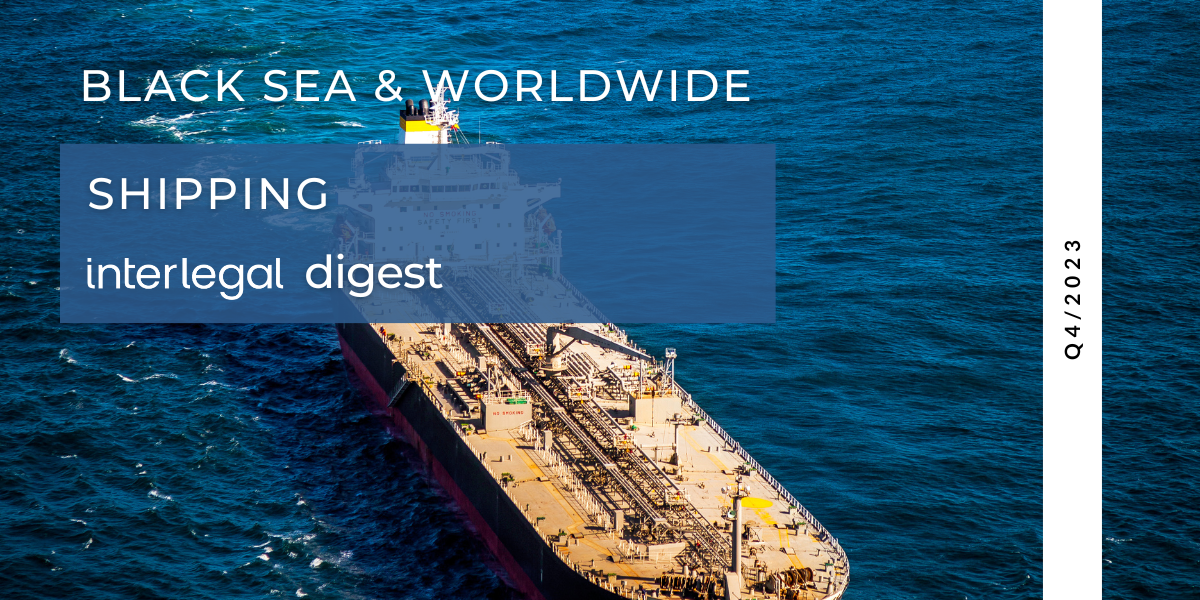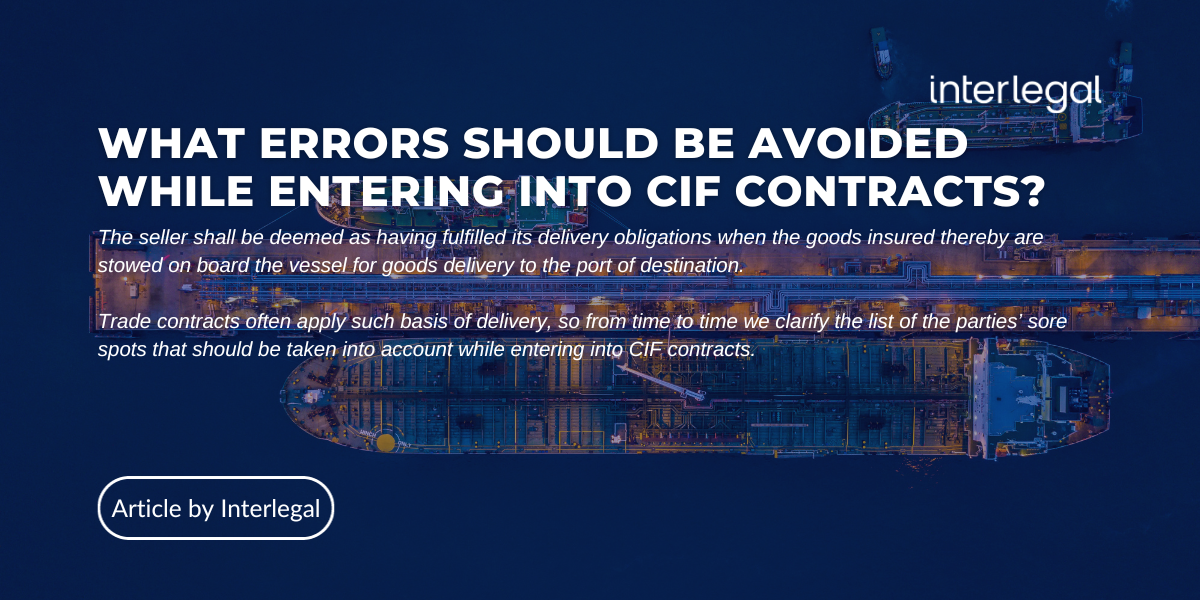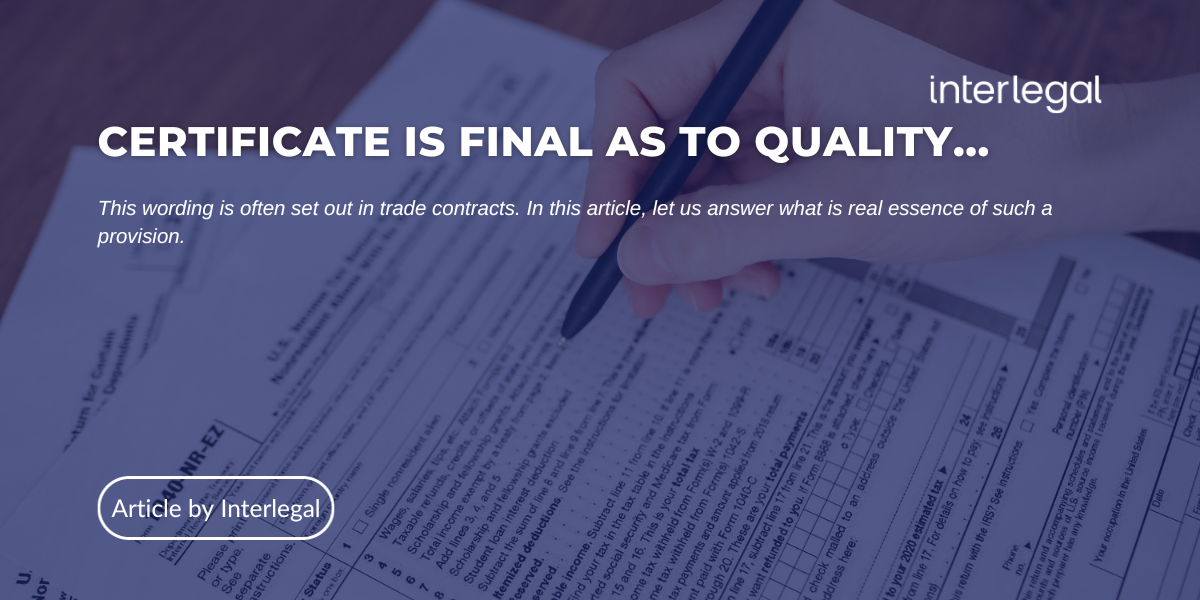Lien as security of obligations in merchant shipping
24 February, 2016
2
In the modern civilized society more attention is paid to the legal guarantees than to responsibility. It is not a surprise, since the goal of the law is the actual implementation thereof, i.e. proper performance, adherence, use of regulations, rights and obligations, including civil ones. Responsibility is a sort of extremity since it assumes negative effects for a violator being a member of society too; therefore the society in whole will also suffer damages. Furthermore, a significant question occurs: whether the damage caused by violator will be compensated, even by bringing of responsible person to liability locally, i.e. within certain legal relationship being violated. Of course, the nature of right itself assumes the legal responsibility so it is treated as one of the methods of guaranteeing stable public relationships. Under such wide approach, the legal guarantees are deemed as all the legal methods of defense and realization of rights and lawful interests. Meantime, there is also a narrow approach to the concept of legal guarantees, in the form of legal actions securing realization of rights and obligations.
Civil law distinguishes an institute of security of obligations as an important method of guaranteeing the obligations. But at the same time some methods of security of obligations are treated as civil liabilities, so even in the narrow sense the guarantees do not exclude legal responsibility for violation, in particular for non-fulfillment of obligations. There is another one – classification of the methods of security of obligations, depending on the legal nature of relationship used for security of obligations. In such sense, there are binding and proprietary methods of security of obligations, i.e. principal obligation may be fulfilled either by means of another additional obligation or by means of property being detached for possible enforecement of right – performance of obligation. Penalty, warranty and a guarantee itself serve as examples of obligations which guarantee security of obligations. Proprietary security of obligations includes pledge and lien. The latter method of security of obligations shall be the subject of our research.
Civil Code of the Ukrainian Soviet Socialist Republic did not provide such method of security of obligations. But the institute of lien was well-known even in the period when Ukraine was included in the Russian Empire. Such institute existed in the Roman civil law (jus retentionis). Historically, the possessory lien developed in favour of similarity with the right of lien. For the period of Independent Ukraine, the Merchant Shipping Code was adopted. Parts 3-5 Article 163 of this Code provide the right of lien on cargo. In such a way the institute of lien appeared in the legal framework of Ukraine. In fact such method of security of obligations did not contradict to civil law even before, since the list of types of security of obligations was not exhaustive. Therefore there was the possibility to stipulate the right of lien in the agreement. After the new Civil Code of Ukraine had been implemented on 01.01.2004, the institute of lien, set forth in Articles 594 – 597 of the Civil Code, developed significantly. Of course statement on the right of lien in the agreement is not compulsory for arising of such right, but it is quite possible and reasonable to govern by the agreement relationship concerning lien of property including cargo.
General principles of possessory lien
In the ancient period the institute of lien caused too many disputes, since it was treated as one of the types of self-defense of rights and thus it contradicted to the general principle of defense of the rights by means of court only. At the present moment the concept of lien got too close to possessory lien in many aspects; in practice they are often treated as interchangeable.
Main prerequisites which required for arising of the lien rights are the following:
1) the creditor legitimately possesses the property to be handed over to the debtor or to person stated by debtor;
2) the creditor is entitled to retain this property in the event of failure of the debtor to pay for such property, or to reimburse the creditor for costs and other losses related to the property.
Content of the right of lien is the fact of possessing the property by creditor or another person different from the debtor or person in respect of which the debtor has instruction on transferring property thereto. So the property may be in possession of not only the creditor but also the custodian, provided that it has been notified on the right of lien but the custodian shall not be the same as the debtor etc. Right of lien is connected to some obligations. In particular, the creditor-retentor shall notify the debtor immediately. Of course the creditor shall not use the property unless such use secures its preservation. Lien has no impact on any right of ownership including right of disposal, i.e. the debtor still has a right to dispose of the property belonging to the debtor as ownership; therefore the debtor is entitled to alienate property to any third person provided that the acquirer is notified on the creditor’s rights including right of lien. New owner will obtain the right to claim for property from the creditor’s ownership only when the debtor’s obligation is recovered. Right of lien also ceases in case when the property appears in ownership of the debtor or person to which it ordered to transfer such property.
Moreover, the retaining creditor’s most important authority is the right of satisfaction from the property cost. In this context the institutes of lien and even pledge are similar but not identical.
Peculiarities of cargo lien in Ukrainian maritime law
According to Part 4 Article 916 of the Civil Code of Ukraine:
The carrier shall be entitled to retain the cargo transferred thereto for transportation in order to ensure the effectuation of the freight charge and other payments, unless otherwise provided by the law, other regulatory documents or results from the substance of the obligation.
So there are no doubts regarding the close relationship between lien and carriage- in general. In respect of relationship arising from carriage by sea, the right of lien is set forth in Article 163 of the Merchant Shipping Code of Ukraine as follows:
During cargo acceptance the consignee is obliged to reimburse the expenses incurred by the carrier due to the cargo, to pay for the vessel demurrage in the unloading port and pay the freight and payment for the vessel demurrage in the loading port should it be envisaged in the bill of lading or another document on the grounds of which the cargo was conveyed, and in case of a general average – to make the average contribution or provide proper security.
The Law of Ukraine on Forwarding Activity provides the forwarder’s right to retain a cargo being in his possession, until recovery of payment to the forwarder and reimbursement of expenses sustained by him in the interests of client, or until other security of fulfillment of client’s obligations in respect of recovery of payment to the forwarder and reimbursement of the abovementioned expenses, unless otherwise provided by the forwarding agreement.
Pursuant to Clause 2 Article 594 of the Civil Code of Ukraine, lien of the property may secure the creditor’s other claims, unless otherwise provided by the agreement or by the law.
According to Terms for Carriage approved by Maersk Line, the largest carrying company:
The Carrier shall have a lien on the Goods and any documents relating thereto for all sums payable to the Carrier under this contract and for general average contributions to whomsoever due. The Carrier shall also have a lien against the Merchant on the Goods and any document relating thereto for all sums due by the Merchant to the Carrier under any other contract whether or not related to this Carriage. The Carrier may exercise his lien at any time and any place in his sole discretion, whether the contractual Carriage is completed or not. In any event any lien shall extend to cover the cost of recovering any sums due and for that purpose the Carrier shall have the right to sell the Goods by public auction or private treaty, without notice to the Merchant. The Carrier’s lien shall survive delivery of the Goods.
Subject of the lien shall be the creditor (retaining creditor) while object of the lien may be the thing only.
Before the lien occurs, there must be certain legal relationship on the grounds of which the creditor possesses the property, i.e. the creditor is legal owner. If the creditor possesses the property illegally the lien will not occur. The lien ceases when the principal obligation ceases.
Pursuant to Part 4 Article 163 of the Merchant Shipping Code of Ukraine, after releasing out the cargo to the consignee the carrier loses its right to require for payments under principal obligation, except for the cases when the carrier was unable to realize the right of cargo lien for reasons beyond his control. Therefore it obviously provides specific grounds for cessation of obligations.
Doctrine of English Law provides a lien right for shipowner. Its up-to-date definition can be found e.g. in case Santiren Shipping Ltd. v. Unimarine S.A. [1981]:
“…A defense available to one in possession of a claimant’s goods who is entitled at common law or by contract to retain possession until he is paid whatever he is owed”.
From the point of view of the Ukrainian law pledge and lien are similar but different terms. The main difference is that in case of cessation of the actual cargo possessing (e.g. in case of its transfer to the consignee) the carrier shall lose its right of lien while the pledge on cargo if duly executed still remains valid.
Lien clause
In order to assess whether the carrier’s (shipowner’s) lien on cargo is lawful, let us study a lien clause incorporated into most of charter parties, on the example of several proformas of charter parties.
Synacomex 2000, as one of the most widely used proforma of charter party for grain carriage, sets forth in Article 21 that the Owners shall have a lien on the cargo for freight, dead freight, demurrage and average contribution due to them under this Charter Party.
Here the list of grounds for cargo lien is exhaustive, as compared to Gencon 94, according to which the Owners shall have a lien on the cargo and on all sub-freights payable in respect of the cargo, for freight, dead freight, demurrage, claims for damages and for all other amounts due under this Charter Party, including costs of recovering same.
According to Lien Clause in Vegoilvoy Charter used for carriage of oils and other liquid cargos, The Owner shall have an absolute lien on the cargo for all freight, dead freight, demurrage and costs, including attorney’s fees, of recovering the same. It states also that the lien shall continue after delivery of the cargo into the possession of the Charterer, or of the holders of any bills of lading covering the same. This clause confirms our suggestion on convergence between institutes of lien and pledge.
Carriage contracts fixed by bills of lading usually contain similar lien clauses or incorporate terms of Charter Party by means of reference «To be used with the Charter Party». If cargo lien is grounded on bill of lading as on evidence of carriage contract, it is necessary to analyze carriage terms stated on reverse side of bill of lading. Full terms of some line bill of ladings (e.g. Maersk Line) are not displayed on reverse side but are placed at the container line website.
Therefore each proforma may contain different grounds for cargo lien, without regards to amendments the Parties may include into lien clause while making the charter party.
Conclusion
Some types of relationship arising from lien still remain unclear in the law science.
E.g. the issue of imperativeness of regulations of lien causes much interest: some researchers suggest that creditor cannot waive its right of lien by means of making the appropriate agreement. Furthermore, the following issues arise: whether there is a sense in lien of your own property, i.e. whether the lien occurs in case when the property is not transferred by debtor, since principal obligations under which the lien may occur are mutual; and if there is no sense, whether the client retaining anyone’s property shall keep it. Like any doctrine, lien is quite a complex combination of public relationships. In practice, in each certain case such relationship is individual due to some peculiarities, so only the expert may understand it surely. It is especially obvious in case when the lien is complicated by any other relationship providing significant peculiarities for this institute. In particular, we pay attention on the fact that lien is treated as an institute of both civil and maritime law and the procedure of cargo lien by sea carrier has essential specifications.
Our recent practice has lots of cases in which the shipowner either has performed its right of cargo lien for any reasons or has threatened to do it.
The most difficult questions arise at the loading port, since the law directly provides only the reimbursement of freight and demurrage at the loading port due to the cargo. But it should be noted that the carrier sustained costs already arisen at the moment of cargo loading on board of the vessel. In particular, in fact the carrier sustained costs related to the vessel route to the loading port (bunker, crew salary etc.) and port dues. Furthermore, there still remain several questions regarding loss of profit. As we see, the aforesaid expenses are not deemed as requirements directly stipulated as those which may serve as grounds for lien. Moreover, in case when the consignor (seller) loses the buyer and the shipowner, accordingly, loses the charterer, there is no sense to speak about reasonability to start voyage under the previously arranged route, so both the consignor and the carrier, remaining alone, face a stalemate situation when each sustains damages due to fault of the third party – the buyer/charterer.
Disputes often come to light at the unloading port only, when the voyage is almost complete but freight still remains unpaid to the carrier. Often in such cases the Seller/Consignor and the Charterer either get lost or cease to participate in negotiations while the Shipowner remains tete-a-tete with the Buyer/Consignee. Meantime the latter, having paid for cargo and having original bills of lading, requires for cargo release. In such cases shipowner may apply the mechanism of defense of its rights, in the form of cargo lien.
Cargo lien by shipowner at the unloading port is usually governed by the charter party. Most standard proformas of charter parties are governed by the English Law.
In order to launch the mechanism of cargo lien, the shipowner (carrier) must comply with the following procedure:
1) to notify the charterer/cargo owner on cargo lien;
2) to refer to the appropriate lien clause;
3) to state grounds for cargo lien from the list set in the lien clause;
4) to announce the date of commencing the lien.
Otherwise the lien may be recognized as unlawful and in such case the shipowner shall reimburse all the incurred damages.
Irrespective of the charter party clauses, peculiarities of local legislation should be also taken into account. It is especially vital when in the process of lien shipowner makes a decision on cargo discharge and its further lien ashore. E.g. in China lawfulness of cargo lien must be recognized by the court while in Spain the shipowner must declare cargo lien within 15 days from the moment of cargo delivery.
Short abstract
This publication studies the institute of lien in respect of cargo lien in merchant shipping. It shows development of the institute of lien, starting from the ancient Roman law and ending with up-to-date interpretation in the national law of Ukraine. It displays both regulations of the institute of property lien in the civil law of Ukraine and relationship arising from cargo lien in the maritime law, in particular in the maritime law of Ukraine. Conclusion highlights some problematic issues still existing in relationship regarding the property lien and describes some mechanisms of cargo lien, as well as peculiarities of lien in some jurisdictions.
























































